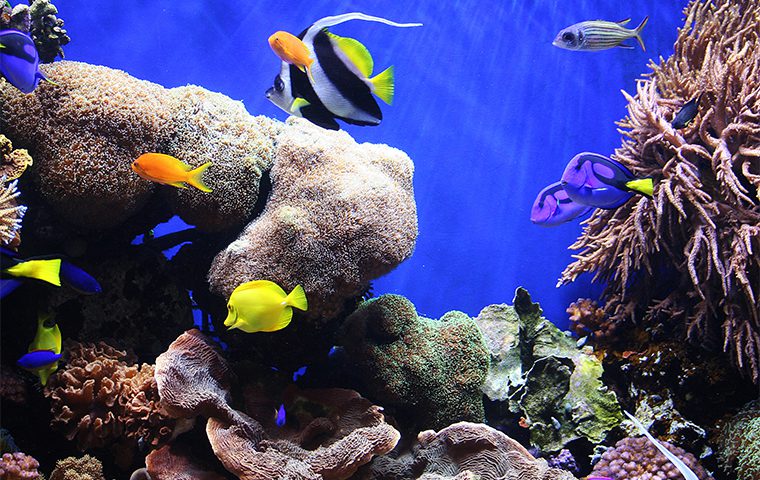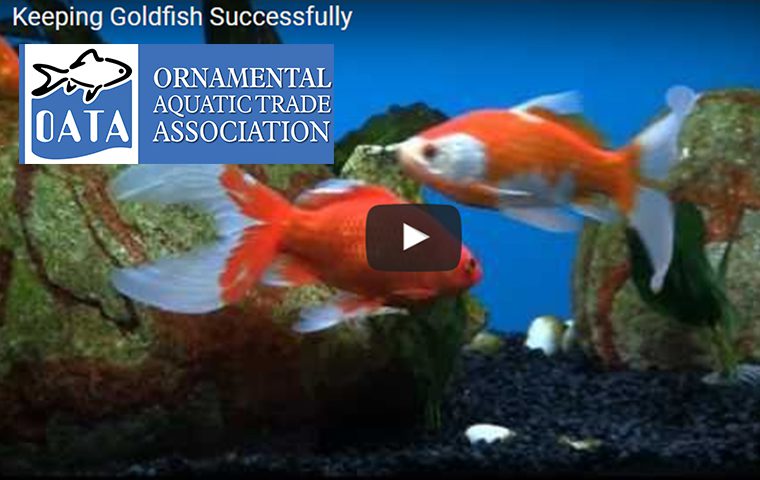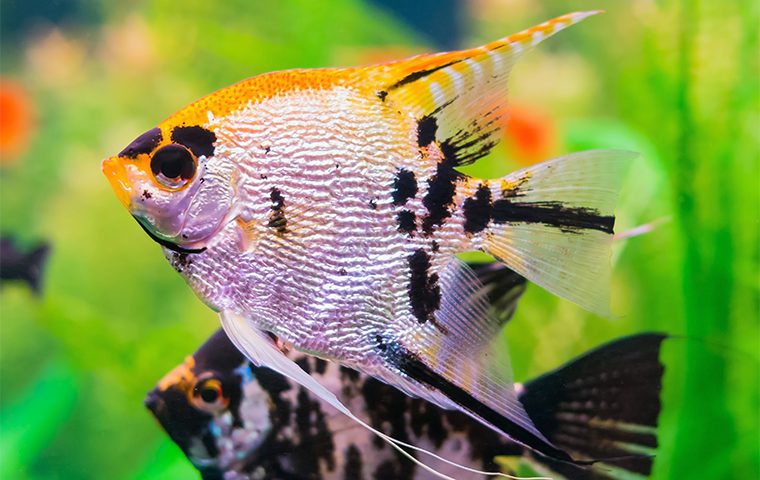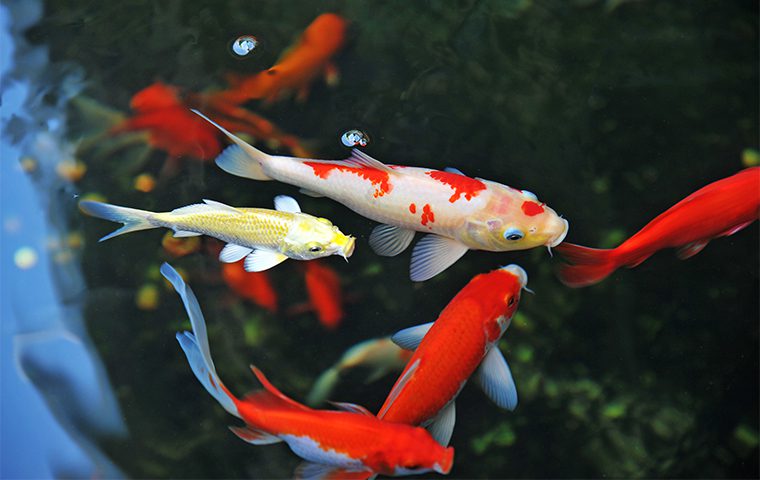
Expert Fishkeeping Advice
Our fishkeeping advice section consists of literally hundreds of pages of advice. If you cannot find the advice you are looking for you can email The WaterZoo at aquatics@waterzoo.co.uk, this will be replied to by one of our senior staff, we will try and respond as quickly as possible, but by the end of the next working day at the latest.
If you query is more urgent then you can call us on 01733 312 142, all our staff are fishkeepers themselves and have industry recognised qualifications, so you can talk to someone that has practical experience in the hobby.
Fishkeeping Advice
At The WaterZoo we believe in providing our Customers with free easy to follow advice. We produce over 15 regularly updated guides helping resolve common problems, answer frequent questions in detail and make the hobby of fishkeeping easier to understand.
Introduction to marine aquariums
A brief introduction to setting up and keeping a marine aquarium
OATA Fishkeeping videos
These short how to videos provided by OATA give basic, but accurate information on keeping fish. Pets for Life episode 7 Fishkeeping special Learning How [...]
OATA Fish Care Species Guides
These how to guides are published courtesy of OATA (Ornamental aquatic trade association.) They are all Adobe PDF files and can be downloaded, and printed if required, just click the title you require, (this [...]
A Guide on Water Quality (Saltwater)
This saltwater quality guide is an explanation and overview of terms like pH, nitrite etc, ideal levels and how to achieve them. A high standard of water quality is the key to a healthy [...]
A Guide on Water Quality (Freshwater)
Good water quality is the key to a healthy and successful aquarium or pond. Many fish health & algae problems are caused by unsuitable or poor water quality. It is important to test your [...]
Frequently Asked Questions
Answers to many common fishkeeping questions we are asked at The WaterZoo.
General Fish Care FAQs
If you are going away for a week or two, you can use an automatic fish feeder or slow release holiday foods can feed your fish while you are away, although it is still worth getting a fishkeeping friend/relative to check everything is OK in your absence.
Many compounds that accumulate in the aquarium cannot be detected by any of our senses, but are harmful to fish and invertebrates. Testing the water enables us to detect these compounds and take remedial measures, before it causes a problem. If the water is of good quality then fish are unlikely to become ill, you cannot tell how good or bad the water quality is by looking at it, clear water does not necessarily mean the water is OK.
To find our more about this subject view our Guide to Nitrate
Whilst some advise waiting a week before adding livestock, we feel 48 hours is sufficient. After this period the aquarium should be up to temperature and all the equipment should be working. Leaving the aquarium/pond longer will not help it establish as it will only start to mature once the filter has some waste to work on. Be sure to read about new tank syndrome before adding livestock and add Seachem Stability.
Provided livestock is properly packaged and does not get too hot or too cold it will be fine for at least six hours. Nearly all tropical & marine fish come from abroad and are often in transit for 24 hours with virtually a zero mortality rate. However, the less time in transit the less traumatic it is.
Feed your fish twice a day. Although they can be fed more often if you wish to achieve a rapid growth rate. Ideally this should be a wide variety including dried & frozen food. All the food should be eaten within 5 minutes. Any left over should be removed ASAP.
Stocking levels are based on either water volume or surface area. There are many variables including the size of fish & filtration system.
These are generally accepted stocking levels.
Cold water 1” of fish per gallon (2.5cm per 4.5 litres)
Tropical 1” of fish per gallon (2.5cm per 4.5 litres) in the first three months, 2” of fish per gallon (5cm per 4.5 litres) after the aquarium has been established for at least six months.
Pond 10” of fish per 100 gallons (25cm per 45 litres)
Marine fish only 1” of fish per 4 gallons (2.5cm per 18 litres) in the first six months, increasing to a maximum of 1” of fish per 2 gallons (5cm per 9 litres) after six months.
Reef aquarium 1” of fish per 4 gallons (2.5cm per 18 litres)
PLEASE NOTE stocking levels are for guidance only. Larger fish produce far more waste than smaller fish. Therefore, when keeping large fish stocking densities should be far lower.
All stocking levels assume a good filtration system has been operating for at least 3 months. The stocking level in new systems should be much lower.
The frequency a filter will require cleaning will depend on many factors, these include, size, efficiency & type of media used in the filter, as well as size, type of fish and the frequency, quantity & type of food used. When you see a decrease in the flow rate this would be a good time to clean the media. Keeping a note of this will enable you to anticipate when the filtration system will next require maintenance. Don’t forget to clean filter media in waste aquarium water to maintain the colony of bacteria.
The frequency & amount of water changed is dependent on many factors these include stocking density, amount / type of food & efficiency of the filtration unit. It is therefore very difficult to generalise. As a very rough guide change between 10 & 25% anywhere from twice a week to once a month. For a more accurate estimation you could test for Nitrate (NO3) if this is increasing then a water change is needed.
Marine FAQs
Live rock is calcareous porous rock taken from tropical oceans it contains many microscopic organisms and is encrusted with algae and small sessile invertebrates. Live rock establishes new aquariums faster, and aids the filtration process as well as reducing nitrate levels. The use of a large proportion of cured live rock is strongly recommended for a reef aquarium.
Most of the Clownfish we have are captive bred and have never seen an Anemone, therefore they are unlikely to go into one even if one is present in the same aquarium. Even wild Clowns will not always go into an Anemone.
The amount of illumination required will depend on the depth of the aquarium and the species being kept. Hardy soft corals like Toadstools will do well under two fluorescent tubes fitted with reflectors in a 24″ deep aquarium. Where as more difficult species like Acropora will require at intense lighting provided by numerous T5 tubes LED’s or suspended metal halides.
Many Corals obtain much of there energy requirements from Zooxanthellae algae that live within their tissues and produce food when exposed to sufficient light. However, nearly, all corals will benefit from being lightly fed with one of the many coral foods available.
Protein skimmers come in many different forms, but they all consist of a chamber that water is pumped through that is heavily aerated, organic pollutants stick to the surface of these bubbles. The pollutants form foam that then climbs up a neck and into the collection cup where it collapses into a dark coloured liquid. While it is possible to maintain a marine aquarium without a skimmer. When you see the smelly dark liquid they collect, you will most likely agree with us that is an important bit of equipment for marine aquariums.
Generally, we would suggest a minimum size of 10 gallons (45 litres), smaller than this can be difficult to maintain a stable environment. Even the highest stocking level for a marine aquarium is 1″ of fish per 2 gallons. Nano aquariums can be used for keeping small crabs, shrimps, snails, and corals if there is plenty of light. They are not recommended for keeping fish.
View our Introduction to Marines – This includes example costings
No. Provided you buy good equipment (the best you can afford), do not cut corners, do not overstock, and carry out frequent maintenance, they are actually quite easy & much longer lived than tropical fresh water fish.
Find out more about keeping marines.
These are generally accepted ideal conditions for most marine invertebrates & fish.
Ammonia 0
Nitrite 0
Nitrate <10
pH 8.2-8.3
KH 8-12
Phosphate 0
Calcium 420 ppm
Magnesium 1300ppm
Salinity 1.022 -1.026
Coldwater FAQs
Only a few species of fish often sold from tropical aquariums are suitable for unheated aquariums. The term coldwater is slightly misleading as what we are normally referring to is unheated aquariums, temperate or sub tropical is a more accurate term. Provided a ‘coldwater’ aquarium is in a relatively warm room then they will probably have a temperature around 18C (65F). At this temperature they are several species that will be at home, these include Paradise Fish, Golden Barbs, Rosy Barbs, and Amano Shrimp. Mixing these fish with Goldfish is not recommended as many are too active to be mixed with Goldfish, especially fancy varieties. Due to the large size of Goldfish, they may eat many of the species listed above.
Many fishkeepers started out with a Goldfish in a bowl or small aquarium without a filter. Whilst it is possible to keep fish without a filter, water quality & clarity will always be a problem. This will also means the water needs changing frequently to maintain an acceptable water quality standard for the aquariums inhabitants. The installation of a filter will reduce the frequency for water changes as well as improving the environment for the fish. Therefore, a filter is essential in our opinion.
All Goldfish have a swim bladder that helps them maintain neutral buoyancy. Due to their shape fancy Goldfish have a compressed swim bladder this causes them to have many more problems maintaining their balance. To prevent balance problems try feeding a wide variety of food including frozen foods like Bloodworm or Daphnia. It is also worth soaking any dried food for a few minutes before feeding. This prevents the food from swelling up inside the fish and putting pressure on the swim bladder. If your fish already has a problem you can try Swim bladder treatment. This, when used in conjunction with salt is quite an effective remedy.
The White ‘fungus’ often seen on the heads of large Orandas is actually the natural mucous secretion fish produce to help protect their bodies. As this is natural using an anti fungus treatment will not have any effect. While it may be unsightly there is very little that can be done to prevent this mucous from collecting on the Orandas hood. However, it will have no effect on the fish’s health.
The most likely reason for the water to be cloudy in a coldwater aquarium is lack of, or insufficient filtration to cope with the waste produced by the fish. Cold water fish are much larger than their tropical counterparts, so therefore need a more efficient filtration system. The most immediate way to clear the water is to carry out a partial water change of say 25% and reduce the amount of food given. The addition of Interpet filter aid will also clear the water, but only in filtered aquariums. While this will clear the water it will not offer a permanent solution. It would be wise to look into the cause. New aquariums also may suffer from cloudy water despite sufficient filtration. Read about new tank syndrome.
Pond FAQs
The quantity of food required by pond fish is largely dependent on the water temperature. The lower the temperature the less they will consume, they will feed down to around 5C. However, they will require far less than they normally eat, so feed them sparingly and remove any excess. When feeding the fish in the winter and the water temperature is below 10C (50F) then the fish should be fed an easily digestible wheat germ food. If the water temperature drops below 5C then it is probably not worth feeding them at all.
Probably the best way to remove the sediment from the bottom of a pond is purchase / hire a pond vacuum. This should be the type that has it’s own pump, not the type that you have to pump manually, we have found these hard work & inefficient. Pond vacs do not handle leaves well these are best removed with a net before vacuuming commences.
They are many ways to reduce the chances of your fish being eaten by Herons, are a just a few.
- Cover your pond with a fine mesh netting, while this may detract from the ponds natural beauty it probably is the most likely method to work.
- Purchase a plastic Heron. Herons are solitary birds and rarely fish close to each other, therefore a realistic Heron standing beside your pond should stop others visiting.
- Lay some lengths of drain pipe in your pond. While this will not stop predators catching your fish, it does give the fish somewhere to seek shelter.
A filter on a pond will benefit any fish, but is not a necessity providing there is a established growth of a variety of plants. It also important to bear in mind that the stocking levels & feeding must be kept to a minimum. Just compare the stocking level in a natural water (see any fish?) to that in an ornamental pond. This will give you an idea what the stocking level should be in an unfiltered pond. In any pond it is a good idea to have a small pump to run either a waterfall or fountain, this will help maintain oxygen levels on hot days.
These sores are most likely ulcers, these are caused by a type of bacteria. The ulcers should be treated as soon as possible to increase the chances of survival. We have had great success with a API Medibacter It is a totally natural product and is totally safe.
I think this is a problem nearly all pond owners encounter at one time or another. This algae called Blanket Weed can quickly fill an entire pond during the summer months. We have found the best product to kill it is Blanket Answer This product is safe with all fish and plants, and it works! One of the good things about Blanket Answer is it kills the algae slowly over a period of weeks rather than all at once. If all the algae is killed at once the decaying matter can starve the fish of oxygen. You can obviously remove Blanket Weed by manual removal although this can be almost a daily task. There are also fish that eat it these are called Grass Carp although they can only eat relatively small amount and will not discriminate against algae & plants. Maintaining low levels of Nitrate & Phosphate also helps as does the removal of sediment from the bottom of your pond. You may have seen the electronic blanket weed controllers advertised, we have used these and have noticed little if any improvement.
Green water is caused by millions of single celled algae, these are so small they pass straight through conventional filter systems. If your pond already has a pump and filter the easiest way to get clear water is to add an ultraviolet clarifier. As the water passes over the UV light the algae is killed, once these are added to a filtration system the water normally clears within a couple of weeks and then stays clear all year round. These units start around £50.00 and cost around £10.00-£20.00 a year to run depending on the size of your pond. If your pond does not have a filter a good growth of plants especially lilies & floating plants is a good way to keep the water clear, these provide shade & compete with the algae for food. As you may also be aware there a many treatments on the market for dealing with green water. In our experience the most effective ones are: Waterlife Algizin G if your pond is filtered. This works by clumping the algae together so it is large enough for the filter to remove. For unfiltered ponds try barley straw, although this slow to work. This is due to the fact bacteria need to grow on it that control the green water so allow a month for it to work.
Tropical FAQs
What many people do not realise is that aquatic plants need light & carbon dioxide to grow. You can use fertilisers, enriched substrate, etc, etc. If you do not provide the carbon dioxide & light your plants are unable to grow. It easier to achieve conditions conducive to growth than you may think. Firstly, your lighting should be on 10-14 hours per day, ideally controlled by a timer. You should have at least one high spec light & reflector, ideally two or more. Some fish keepers grossly overestimate the amount of oxygen fish require. It is not recommended to have any aeration in your aquarium. This is one of the best ways of stopping your plants growing. The oxygen fish require will enter through the surface of the water. Remove any air stones or turn down to the absolute minimum, ensure all water returning to the aquarium from filters does not agitate the surface. This will increase the amount of carbon dioxide in the aquarium. The addition of carbon dioxide is highly recommended for those serious about growing plants.
Click here for more information on growing aquarium plants.
The most likely reason for cloudy water is that the filter is not yet mature. It takes several weeks from when the first fish are added for your filter to be colonized by sufficient bacteria to breakdown the waste they produce. If your fish are lethargic or hanging at the water surface, chances are there is a high ammonia & or nitrite level. This is poisonous to your fish. Although the only way to be sure is checking it with a readily available test kit. The cloudiness can be reduced by adding Seachem Clarity, although this will not improve the water quality for your fish.
Read about new tank syndrome.



